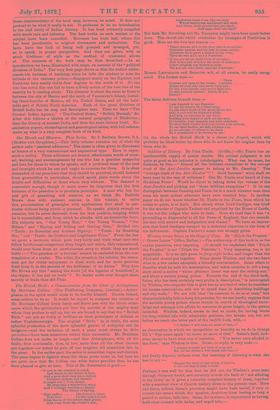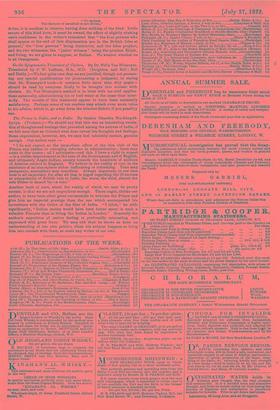Wisdom versus Satan on the Stage of Time. By "
Elijah the Prophet." ("Drews Letter" Office, Belfast.)—The authorship of this book is, as the reader perceives, very imposing. (It should be explained that "Elijah the Prophet" is not "Elijah the Tishbite.") Very imposing, too, is its magnitude. It is an epic poem in forty-eight books, and longer than the Iliad and Aeneid put together. Satan meets Wisdom, and the two have what is, a few sneers excepted, a friendly conversation. Satan offers to describe what he calls his masterpiece, and takes occasion to tell a long story about a nation "whose pleasant home was near the setting-sun," and about a certain young prince. Towards the end of the third book, Satan, who has been certainly very prolix in description, " is interrupted by Wisdom, who requests him to give her an account of what he considers his human masterpiece, and not to spend time in describing buildings and city walls." We are told that "he consents to do so at once," but characteristically fails to keep his promise, for we can hardly suppose that the amiable young prince, whose travels in search of theological know- ledge and unhappy love affairs ho narrates at great length, is the person intended. Wisdom, indeed, seems to feel as much, for having borne his long-winded tale with admirable patience, she breaks out, but not before we roach the latter part of the twelfth book, with,- " 0 Satan! I will hear no more of this,—"
an observation in which we sympathise as heartily as we do in George
" Pye come again!! no more, no more of that." Satan's fault, how- ever, seems to have been one of omission. "You never once alluded to the Jews," says Wisdom to him. Satan, in reply, is very rude:- " I always thought but little of your wit,
But for the future I will think still less,—"
and finally departs, without oven the courtesy of listening to what she
has to say :— "Repeat thy story to the winds of heav'n, I will not stay to hear it told."
Perhaps it was well for him that he did not, for Wisdom's story lasts through thirty-six books, and certainly avoids the fault of "not alluding to the Jews," as it gives a tolerably complete history of them, together with a succinct view of Church history down to the present time. Here and there, indeed, Satan's presence might have been useful, if only to correct the errors which the speaker, doubtless from having so long a period to review, falls into. Satan, for instance, is represented as having held close counsel with Arius, and urged him,—
" To declare The Saviour of mankind is not divine,"
Arius, it is needless to observe, having done nothing of the kind. Little errors of this kind have, it must be owned, the effect of slightly shaking one's confidence in the writer's statement that " the four persona who shall appear at the end of this dispensation are in the British Isles at present," the "four persona" being Antichrist, and the false prophet, and the two witnesses, the "junior witness" being the prophet Elijah, and living, we are given to suppose, at Belfast. We wonder whether he is an Orangeman.



































 Previous page
Previous page